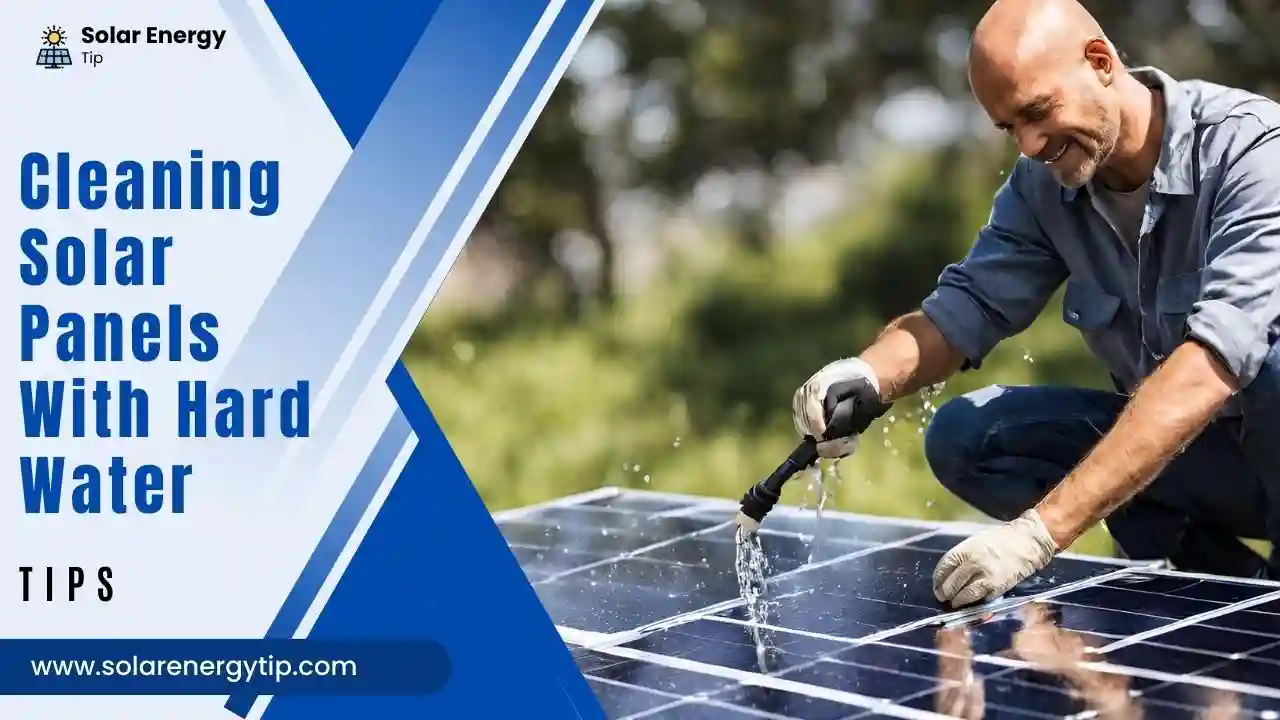If you are using solar panels to complete your electricity demand, then cleaning is most important for their efficiency and increased lifespan.
In that case, If in your area, available water is hard water, then here I introduce cleaning solar panels with hard water.
When it comes to cleaning solar panels, utilizing hard water might be especially difficult.
Yo, check it out, This report from the United States Geological Survey says that over 85% of the US has hard water.
Crazy, right?
This increase can make the panels less effective and lead to less energy being made.
Hey, check out these tips for how to clean solar panels with hard water.
What Is Hard Water? 💧
Hard water is heightened in calcium, magnesium, and iron. Hard water is mineral-rich. Hard water contains these minerals in high amounts due to their location.
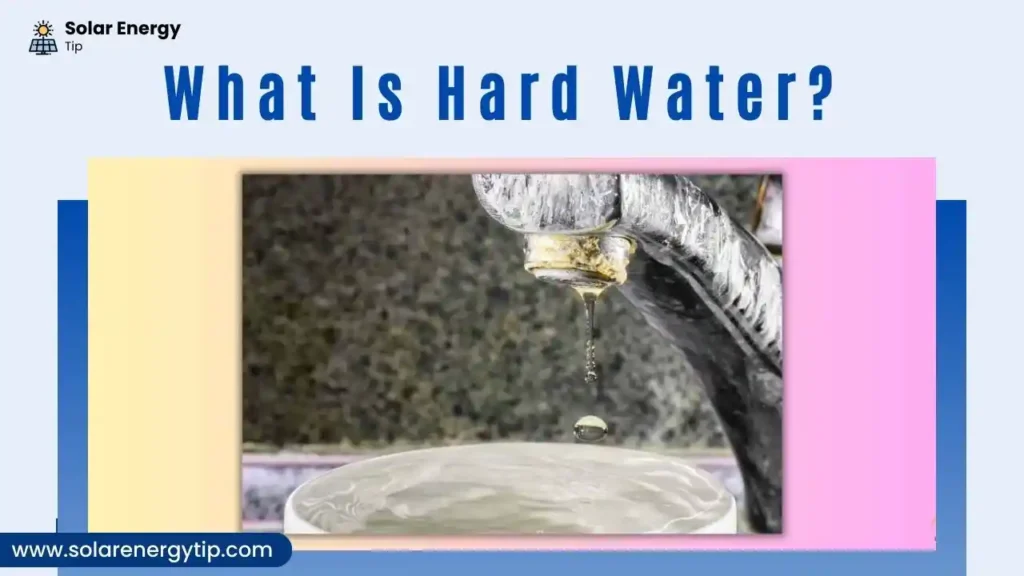
Mineral-rich hard water contains calcium, magnesium, and iron.
Mineral accumulation in pipes, appliances, and fixtures reduces efficiency.
Hard water can also generate soap scum in the shower, make soap lather poorly, and leave a film on dishes and glasses.
Water hardness is usually measured in GPG or PPM. Water under 1 GPG is mild, while water over 7 GPG is quite hard.
Many homeowners install water softeners or water conditioning devices that remove minerals from hard water.
This can extend pipe and appliance lifespans and reduce costly repairs and replacements.
Over 75% of Texas families and 90% of California households have hard water. Florida, Arizona, and New Mexico also have hard water.
Cleaning Solar Panels With Hard Water Some Facts💦
Solar panels are so awesome, dude. 🤗
Yo, bro, if your solar panels are dirty, they won’t work as well. Cleaning your solar panels can help you save money and increase energy production.
Does Hard Water Damage Solar Panels?
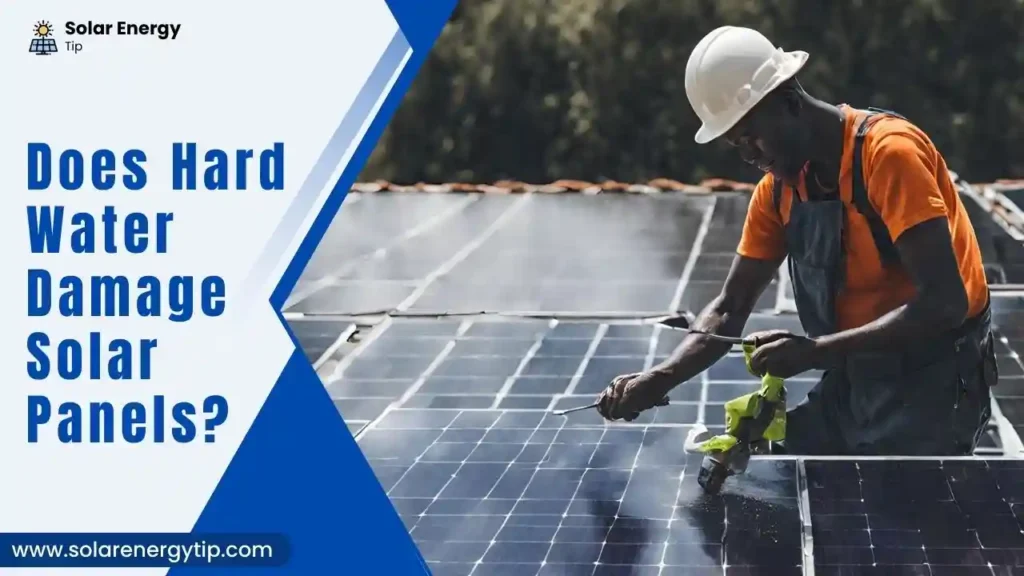
Hard water might cause solar panel cleaning issues. Hard water contains a lot of calcium and magnesium. Water with limestone or chalk formations can damage solar panels.
Risks associated with cleaning solar panels using hard water include:
- Solar panels with mineral deposits provide 25% less energy.
- These mineral deposits coat the panels,
- Reducing solar cell light absorption.
- Energy output and efficiency decrease.
Solar panels must be maintained to maximize energy production. Location and environment affect solar panel maintenance.
Solar panels may need additional cleaning in dusty or polluted environments.
Soft water cleans solar panels best. Soft water’s low mineral content protects panels. To prevent scratches on solar panels.
Solar panels should be cleaned properly and protected from hard water buildup.
But, hard water is available in many locations throughout the US, making it necessary to clean solar panels with hard water in some cases.
So, in that case, using water softeners to convert hard water to soft water works well.
Convert Hard Water to Soft Water For Cleaning Solar Panels
Hard water softeners remove minerals, making them safe for solar panel cleaning.
Mineral deposits form on solar panels cleaned using hard water.
These mineral deposits can affect the efficiency of solar panels by blocking sunlight and reducing energy production.
Soft or filtered water should be used to clean solar panels to avoid this problem. Pure water removes all impurities, while soft water removes mineral deposits.
So, to remove mineral deposits, rinse the solar panels after washing them with hard water. Consider using a hard water cleaning solution. Use a cleaning product to clean with hard water.
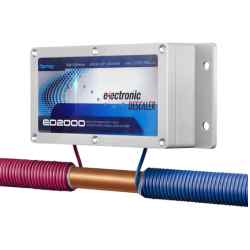
iSpring ED2000 Whole House Water Descaler
Different from a Water Softener
- Improve Water Quality
- Water Conditioner
- Does not affect the flow rate
Solar panels require regular cleaning to be efficient and last longer. If you have hard water, you can purchase a water softener or use filtered water for cleaning.
If you’re not sure how to clean solar panels, hire a pro. These experts clean solar panels safely and effectively.
9 Tips For How to Clean Solar Panels With Hard Water 💦
There are many places where soft water is very difficult to get, and hard water is abundant there; we got information about how solar panel users will use hard water only at such times.
This can be difficult to do thoroughly since the minerals in the water can deposit minerals on the panels’ surface, decreasing their effectiveness.
When cleaning solar panels, it’s crucial to employ the proper methods to avoid this.
The following 9 suggestions can help for proper clean solar panels with hard water:
1. Use a mild soap solution
Solar panel cleaning requires a milder washing solution. This prevents panel scratches during cleaning.
Avoid using abrasive cleaning chemicals since they can damage the surface being cleaned. This surface should be cleaned without abrasives.
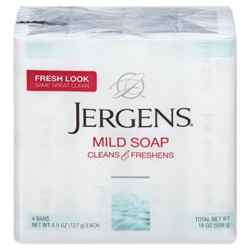
Different from a Water Softener
Cleans gently without stripping away the essential moisture your skin needs; the formula is fully comprised of natural components.
2. Use a soft-bristled brush or sponge
Using a sponge or soft brush, carefully scrub the panels without scratching or marring them.
This will help remove mineral buildup on the panels without damaging them. It won’t harm either.
Avoid using abrasive cleaning instruments at all costs. These cleaning tools can damage panel surfaces.
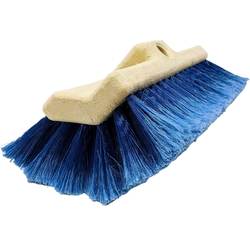
Teravan 10″ Flow-Thru Bi-Level
Wide Scrub Brush
Medium-soft bristles are easy on most surfaces. Ideal for extra cleaning. Thick, dense, scratch-free soft fibers.
3. Water softeners make the following jobs easier
Water softeners are more popular than water conditioning systems for lowering mineral content in water.
This will make the cleaning process with hard water easier and reduce mineral accumulation. To achieve this purpose, water minerals may need to be reduced. This must happen.
4. Rinse thoroughly
After washing the panels with soap and water, they must be rinsed with filtered or softened water to remove any missing soap residue or mineral deposits.
This is necessary to remove soap residue and deposits. This can assist in cleaning the panels and remove any residue that could prevent them from performing their intended function.
5. Avoid cleaning during hot or sunny weather:
When washing solar panels in sunny or hot weather, the soap solution may dry too rapidly, creating streaks.
Washing panels in cooler weather avoids this. Cleaning panels in the shade can prevent this issue.
The best time to clean solar panels is in the early in the morning or on a cloudy day.
Because the sun’s rays are weaker at these times, solar panels are less likely to be harmed when the sun’s beams are weaker.
6. Avoid high-pressure sprays:
High-pressure sprays can harm solar panels, so they should not be used for cleaning.
Low-pressure sprays do not do this. Sprays are best. Instead, use moderate-pressure sprays, which are advised.
7. Squeegees can remove water from the following surfaces:
Before mounting, squeegee the panels after a quick wash and rinse.
This removes any moisture left on the panels after cleaning. Your activities will reduce moisture exposure, reducing water spots and streaks on the panels.
8. Regular cleaning:
Regularly cleaning solar panels prevents mineral buildup and extends their useful life. Thus, you can use your solar panels more.
Solar panels should be cleaned at least once or twice a year, depending on dirt and debris and residence location. Solar panels need twice-yearly cleaning. Clean solar panels twice a year.
9. Hire a Professional Cleaning Service:
Hire a specialist if you need help cleaning your solar panels. Ensures proper execution. These steps clean vehicle panels thoroughly.
They can safely clean your solar panels. They’ve always done this. They’ll utilize it.
5 Steps for Washing Solar Panels With Hard Water
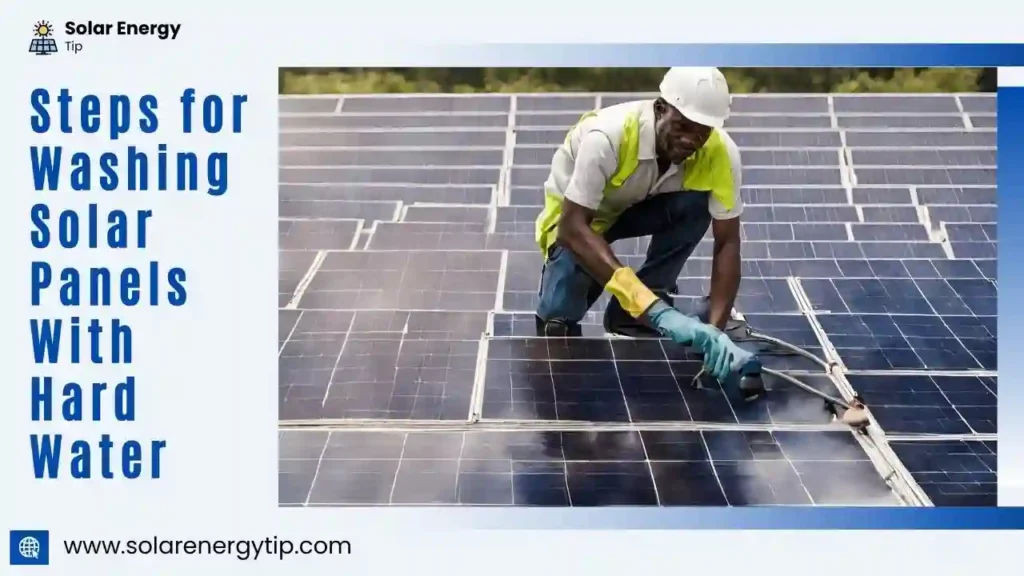
Wash panels with hard water carefully to avoid damage. Five main steps are here which you considered:
Step 1: Preparation
Before cleaning, it is important to prepare.
👉 Gathering the necessary materials: Cleaning solar panels requires a soft-bristled brush, squeegee, pail of warm water, and cleaning solution. Use a panel-safe, residue-free cleaner.
👉 Safety precautions to take before cleaning: Before cleaning, protect your skin and eyes with gloves and safety glasses. Make sure the ground under the panels is stable and free of impediments.
👉 Selecting a cleaning time: Solar panels are best cleaned in the morning or late afternoon when they are cool, and there is less direct sunlight. When cleaning hot panels, water evaporates too quickly, producing streaks and residue.
Step 2: Wetting Panels
To uniformly apply hard water cleaning solution to solar panels, moisten them first. Water the panels with a hose.
Hard water can remove dirt and debris on panels at this stage. However, excessive water pressure can harm the panels.
Wet the panels at the right time. Wetting the panels in the morning or evening will avoid streaks and blotches.
Step 3: Cleaning Solution
After wetting the panels, use a cleaning solution. Cleaning treatments can be homemade or purchased for hard water.
In a spray bottle, mix water and vinegar. This eco-friendly, easy-to-make solution cleans solar panels well.
Avoid steel wool and brushes, which can harm the panels and diminish their performance.
Look for a business solar panel cleaning product that is safe for hard water. Follow the manufacturer’s directions and avoid getting the solution on your skin or eyes.
Select a panel-safe cleaning solution that won’t leave a residue. Always test a small patch to confirm the solution is safe for your solar panel system.
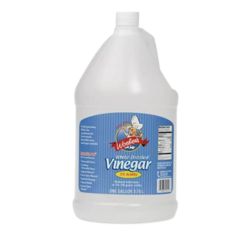
Best Solar Panel Cleaner Concentrate
One Shot 1S-CSPC
- Ammonia-free, streak-free, non-smearing,
- No harsh chemicals
- Eco-friendly and user-friendly
- Maintains efficiency
Step 4: Cleaning Panels
Cleaning solar panels with hard water must be done properly to avoid damage. Panel cleaning tips:
- 👉 Proper technique for cleaning solar panels: Clean solar panels with a gentle brush or sponge. Work from the panel’s top down. Clean dirt with a gentle circular motion.
- 👉 Cleaning tools: Use a bucket or hose to rinse the panels. Squeegees can also remove water from panels.
- 👉 Precautions to take when cleaning: Avoid abrasive cleaners and chemicals that could damage the panels.
Clean the panels gently to avoid scratches. Direct sunshine can cause the cleaning solution to dry too rapidly and smear the panels.
Follow these ways to clean solar panels without damaging them.
Step 5: Rinsing Panels
Rinse solar panels after cleaning. Remove all cleaning solutions and dirt from the panels. Again, use a hose with a mild spray attachment.
Rinse the panels with the hose to remove all cleaning solutions and grime. Cover all panels, including edges and corners.
Look for dirt. Use a soft-bristled brush or sponge to clean any remaining spots gently.
Rinse the panels until the cleaning solution and grime are gone. Squeege or dry the panels after rinsing.
Before powering up, let the panels dry completely. This prevents panel water stains and streaks.
Rinse panels gently. Too much pressure or aggressive cleaning instruments can harm panel surfaces and diminish efficiency over time.
FAQs
How often should solar panels be cleaned?
Clean solar panels twice yearly, more often if dusty or polluted, to maximize energy production. Check often for dirt buildup.
Can I use vinegar to clean my solar panels?
Yes, vinegar safely cleans solar panels. Spray panels with vinegar water, gently scrub with a soft brush, and rinse. Harsh chemicals/abrasives can damage panels.
Will cleaning my solar panels increase energy production?
Yes, cleaning solar panels boosts energy generation by removing accumulated dirt, dust, and debris. Cleaning can increase production by up to 30%, so clean periodically.
How do you remove hard water stains from solar panels?
Use non-heated potable water, a glass cleaner like Windex, or a 3% dish soap solution to clean solar panels. Avoid mineral-heavy water. 1,500 PSI-passured water can be used if needed.
What is the best way to remove calcium buildup?
Brush off gunk and blot dry. Make a paste of equal baking soda and vinegar, and rub on mineral deposits. Let sit for 5 minutes to loosen deposits.
Can I use a pressure washer to clean solar panels with hard water?
No, pressure washing solar panels with hard water damages them. The pressure can shatter panels, reducing performance and longevity. Use soft water and gentle cleaning methods.
Can I use soap or detergent to clean solar panels with hard water?
No, it is not recommended to use soap or detergent for cleaning solar panels with hard water. These compounds have the potential to damage the panels, which will, in turn, decrease their efficiency.
Final Words
In conclusion, cleaning solar panels with hard water produces the most energy and works efficiently.
Follow these steps to clean your solar panels and eliminate hard water mineral buildup.
Avoid scratching panels by using gentle cleaning solutions and soft-bristled brushes or sponges.
To avoid water spots and streaks, rinse the panels with soft or filtered water to remove soap and mineral deposits.
Clean solar panels look good and yield the most electricity. Don’t allow hard water to stop you from using solar energy.
Follow these tips and steps recommendations for years of clean and efficient panels.

